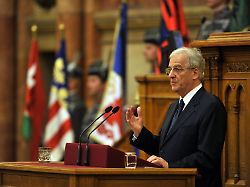Considered the “Father of Democracy”
Hungary’s former head of state Solyom dies
October 8, 2023, 3:40 p.m
Listen to article
This audio version was artificially generated. More info | Send feedback
From 2005, Laszlo Solyom was head of state of Hungary and played an important role in building democracy after the fall of communism – until he was replaced by a party colleague in 2010 by the new head of government, Viktor Orban. Now the trained lawyer has died at the age of 81.
Hungary’s former president Laszlo Solyom has died at the age of 81. This was reported by the Hungarian state news agency MTI, citing Solyom’s secretariat. As head of state (2005-2010), Solyom particularly advocated a leading role for the Constitutional Court, newly created after the fall of communism, as a guarantor of the rule of law and a cornerstone of democracy.
Previously, as President of the Constitutional Court (1990-1998), he had set the course for the constitutional state that was to be established at the time. Under his leadership, the Constitutional Court promoted, among other things, the abolition of the death penalty, the right to abortion, laws on the status of the state president and the referendum. From 1994 to 1998, Solyom was also a member of the Venice Commission of the Council of Europe, which was important for advising the new Central-Eastern European democracies.
Doctorate on German civil rights
In 2010, numerous intellectuals asked the then new head of government, Viktor Orban, to nominate Solyoms as head of state again. However, the right-wing populist Orban decided against Solyom and in favor of his party colleague Pal Schmitt. In Hungary, the head of state is elected by parliament. Before the fall of communism, Solyom was a member of the ecological opposition movement “Donau-Kreis”. In 1987 he was a founding member of the now-defunct conservative opposition party Hungarian Democratic Forum (MDF).
Born on January 3, 1942 in the southern Hungarian university town of Pecs, he studied law in his hometown. In 1966 he taught at the University of Jena in what was then the GDR as an assistant in the chair for civil rights and also received his doctorate there on the subject of German civil law. From 1983 he taught at several universities in Budapest. He was a visiting professor in Cologne for two years.
